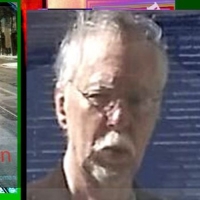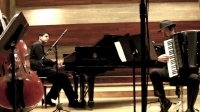Violin Sheet Music
 "My music fights against the system that teaches to live and die." Bob Marley
"My music fights against the system that teaches to live and die." Bob Marley
Music theory

Music theory is the study of the practices and possibilities of music. The Oxford Companion to Music describes three interrelated uses of the term "music theory"
Traditional

Cesar Cui
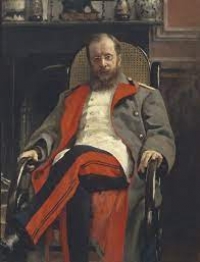
César Antonovich Cui (Russian: Цезарь Антонович Кюи, tr. Tsézar Antónovich Kyuí, IPA: (About this soundlisten); French: Cesarius Benjaminus Cui; 18 January 1835 – 13 March 1918) was a Russian composer and music critic, member of the Belyayev circle and The Five – a group of composers combined by the idea of creating a specifically Russian type of music. As an officer of the Imperial Russian Army he rose to the rank of Engineer-General (equivalent to full General), taught fortifications in Russian military academies and wrote a number of monographs on the subject.
antonio cericola
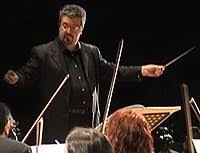
He began his musical studies in parallel with the classical ones, obtaining at the Conservatory of S. Cecilia, the International Academy of Arts in Rome and the Scuola Superiore dell'A.M.P. piano diplomas, piano teaching, composition, musical analysis, choir conducting, orchestra conducting.
Alexander Korolev
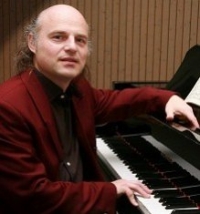
The Ukrainian pianist and music pedagogue, Alexander (Sacha) Korolev , made his first experiences as a pianist at the local music school in his hometown Kiev. His talent was encouraged by skillfully able teachers. Playfully he mastered piano pieces that were very difficult for his age.
Paganini

Niccolò Paganini (27 October 1782 – 27 May 1840) was an Italian violinist, violist, guitarist, and composer. He was one of the most celebrated violin virtuosi of his time, and left his mark as one of the pillars of modern violin technique. His caprice in A minor, Op. 1 No. 24 is among his best known of compositions, and serves as inspiration for many prominent artists.
Paganini composed his own works to play exclusively in his concerts, all of which had profound influences on the evolution of violin techniques. His 24 Caprices were probably composed in the period between 1805 to 1809, while he was in the service of the Baciocchi court. Also during this period, he composed the majority of the solo pieces, duo-sonatas,trios and quartets for the guitar. These chamber works may have been inspired by the publication, in Lucca, of the guitar quintets of Boccherini. Many of his variations (and he has become the de facto master of this musical genre), including Le Streghe, The Carnival of Venice, and Nel cor più non mi sento, were composed, or at least first performed, before his European concert tour.
Playbill of Paganini's concert at the Covent Garden in 1832. Note that all solo pieces were of his composition, which was typical of all his concerts.
Generally speaking, Paganini's compositions were technically imaginative, and the timbre of the instrument was greatly expanded as a result of these works. Sounds of different musical instruments and animals were often imitated. One such composition was titled Il Fandango Spanolo (The Spanish Dance), which featured a series of humorous imitations of farm animals. Even more outrageous was a solo piece Duetto Amoroso, in which the sighs and groans of lovers were intimately depicted on the violin. Fortunately there survives a manuscript of the Duetto which has been recorded, while the existence of the Fandango is known only through concert posters.
However, his works were criticized for lacking characteristics of true polyphonism, as pointed out by Eugène Ysaÿe. Yehudi Menuhin, on the other hand, suggested that this might have been the result of his reliance on the guitar (in lieu of the piano) as an aid in composition. The orchestral parts for his concertos were often polite, unadventurous, and clearly supportive of the soloist. In this, his style is consistent with that of other Italian composers such as Paisiello, Rossini and Donizetti, who were influenced by the guitar-song milieu of Naples during this period.
Paganini was also the inspiration of many prominent composers. Both "La Campanella" and the A minor caprice (Nr. 24) have been an object of interest for a number of composers. Franz Liszt, Johannes Brahms, Sergei Rachmaninoff, Boris Blacher, Andrew Lloyd Webber, George Rochberg and Witold Lutosławski, among others, wrote well-known variations on these themes.
Paganini composed his own works to play exclusively in his concerts, all of which had profound influences on the evolution of violin techniques. His 24 Caprices were probably composed in the period between 1805 to 1809, while he was in the service of the Baciocchi court. Also during this period, he composed the majority of the solo pieces, duo-sonatas,trios and quartets for the guitar. These chamber works may have been inspired by the publication, in Lucca, of the guitar quintets of Boccherini. Many of his variations (and he has become the de facto master of this musical genre), including Le Streghe, The Carnival of Venice, and Nel cor più non mi sento, were composed, or at least first performed, before his European concert tour.
Playbill of Paganini's concert at the Covent Garden in 1832. Note that all solo pieces were of his composition, which was typical of all his concerts.
Generally speaking, Paganini's compositions were technically imaginative, and the timbre of the instrument was greatly expanded as a result of these works. Sounds of different musical instruments and animals were often imitated. One such composition was titled Il Fandango Spanolo (The Spanish Dance), which featured a series of humorous imitations of farm animals. Even more outrageous was a solo piece Duetto Amoroso, in which the sighs and groans of lovers were intimately depicted on the violin. Fortunately there survives a manuscript of the Duetto which has been recorded, while the existence of the Fandango is known only through concert posters.
However, his works were criticized for lacking characteristics of true polyphonism, as pointed out by Eugène Ysaÿe. Yehudi Menuhin, on the other hand, suggested that this might have been the result of his reliance on the guitar (in lieu of the piano) as an aid in composition. The orchestral parts for his concertos were often polite, unadventurous, and clearly supportive of the soloist. In this, his style is consistent with that of other Italian composers such as Paisiello, Rossini and Donizetti, who were influenced by the guitar-song milieu of Naples during this period.
Paganini was also the inspiration of many prominent composers. Both "La Campanella" and the A minor caprice (Nr. 24) have been an object of interest for a number of composers. Franz Liszt, Johannes Brahms, Sergei Rachmaninoff, Boris Blacher, Andrew Lloyd Webber, George Rochberg and Witold Lutosławski, among others, wrote well-known variations on these themes.
Johann Nepomuk Hummel
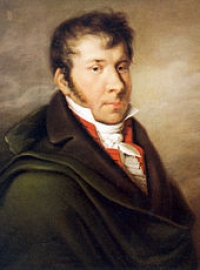
Johann Nepomuk Hummel (14 November 1778 – 17 October 1837) was an Austrian composer and virtuoso pianist. His music reflects the transition from the classical to the romantic musical era.Hummel was born as an only child (which was unusual for that period) in Pressburg, Kingdom of Hungary (now Bratislava, Slovakia). He was named after the Czech patron saint John of Nepomuk. His father, Johannes Hummel, was the director of the Imperial School of Military Music in Vienna; his mother, Margarethe Sommer Hummel, was the widow of the wigmaker Josef Ludwig. The couple married just four months beforehand.
Oskar Rieding
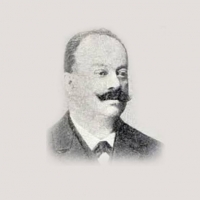
Oskar Rieding was a German violinist, teacher of music, and composer. Born: 1840, Northern Germany
Died: 1918, Celje, Slovenia Books: Air Varie Op. 23 No. 3: Violin & Piano,
Died: 1918, Celje, Slovenia Books: Air Varie Op. 23 No. 3: Violin & Piano,
bijan mortazavi
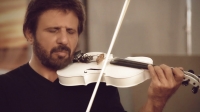
Bijan Mortazavi (Persian: بیژن مرتضوی, born November 16, 1957) is an Iranian virtuoso violinist, musician, composer, songwriter, arranger and singer.Born in the city of Sari, Iran. Mortazavi studied music in Tehran. He was trained in improvisation, orchestration, arrangement, quarter tone technique, and dastgah by various well-known violinists in Iran.
Rolf Lovland
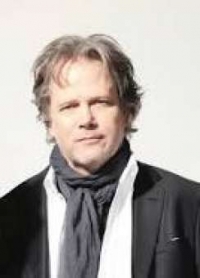
Rolf Undsæt Løvland (born 19 April 1955) is a Norwegian composer, lyricist, arranger, and pianist. Together with Fionnuala Sherry, he formed the Celtic-Nordic group Secret Garden, in which he was the composer, producer, and keyboardist. He began composing at an early age (he formed a band at the age of nine) and grew up studying at the Kristiansand Music Conservatory, later receiving his master's degree from the Norwegian Institute of Music in Oslo. Løvland has won the Eurovision Song Contest twice, composing the songs "La det swinge" in 1985 and "Nocturne" in 1995 alongside Secret Garden, resulting in Norway's first two titles.
Angel Villoldo
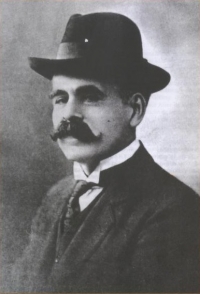
Ángel Gregorio Villoldo Arroyo (16 February 1861 – 14 October 1919) was an Argentine musician and one of the pioneers of tango music. He was lyricist, composer, and one of the major singers of the era. He is also known by the pseudonyms A. Gregorio, Fray Pimiento, Gregorio Giménez, Angel Arroyo, and Mario Reguero. Villoldo transformed the Spanish tanguillos, the cuplés, and the habaneras, turning the continental genres into native Argentinian rhythms.
Davey Arthur
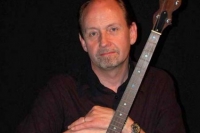
Davey Pat Arthur is an Irish folk singer. Originally from Donegal, Arthur moved to Scotland at the age of two. He started to play music at the age of eight, and returned to Ireland aged 18. Known for playing the banjo, mandolin and guitar, he was originally a solo artist before joining with the Furey Brothers in 1978.
Stephen Rippy
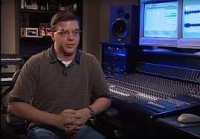
Stephen A. Rippy (born 1975) is an American composer.Rippy grew up in the Spring area of Harris County, Texas and now resides in Plano, Texas, near Dallas. Making video game music was not Rippy's original career goal. He attended the University of Texas in the early 1990s to study visual art, and only took a few music courses.Rippy worked for Ensemble Studios as the head of the Audio department with friend and collaborator Kevin McMullan. He is best known for his sound design and scores on the Age of Empires series, its spin-off Age of Mythology, and the Xbox 360 strategy game Halo Wars.
Alphons Czibulka
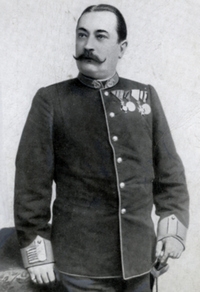
Alphons Czibulka, Alfons Czibulka, or Czibulka Alfonz (14 May 1842 – 27 October 1894) was an Austro-Hungarian military bandmaster, composer, pianist, and conductor.Czibulka was born in Spišské Podhradie (German: Kirchdrauf, Hungarian: Szepesváralja), district of Spiš (Hungarian: Szepes County), Upper Hungary. He first came to prominence from the age of 15 touring Southern Russia giving piano recitals and concerts. He eventually became musical director at the French Opera in Odessa and at the National Theatre in Innsbruck, in 1865 he was second under Franz von Suppe as conductor at the Carl Theatre in Vienna.
Tomaso Antonio Vitali
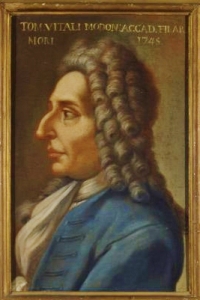
Tomaso Antonio Vitali (March 7, 1663 – May 9, 1745) was an Italian composer and violinist from Bologna, the eldest son of Giovanni Battista Vitali. He is known mainly for a chaconne in G minor for violin and continuo, which was published from a manuscript in the Sächsische Landesbibliothek in Dresden in Die Hoch Schule des Violinspiels (1867) edited by German violinist Ferdinand David. That work's wide-ranging modulations into distant keys have raised speculation that it could not be a genuine baroque work.
Astor Piazzola

Astor Pantaleón Piazzolla (Spanish pronunciation: , Italian pronunciation: ; March 11, 1921 – July 4, 1992) was an Argentine tango composer, bandoneon player, and arranger. His oeuvre revolutionized the traditional tango into a new style termed nuevo tango, incorporating elements from jazz and classical music. A virtuoso bandoneonist, he regularly performed his own compositions with a variety of ensembles.
In 1992, American music critic Stephen Holden described Piazzolla as "the world's foremost composer of tango music"
In 1992, American music critic Stephen Holden described Piazzolla as "the world's foremost composer of tango music"
Benjamin Vining
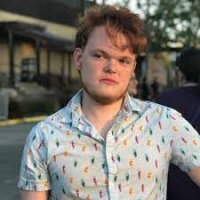
Ben Vining. Chicago, Illinois. Hi, I'm Ben! I'm a producer, composer, and songwriter from Phoenix, AZ. I love experimenting with unconventional production ...
Scarlatti
Giuseppe Domenico Scarlatti was an Italian composer. He is classified primarily as a Baroque composer chronologically, although his music was influential in the development of the Classical style and he was one of the few Baroque composers to transition into the classical period.
Johann Joachim Quantz
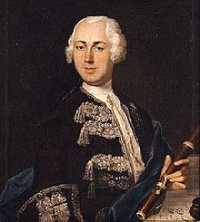
Johann Joachim Quantz (German: ; 30 January 1697 – 12 July 1773) was a German composer, flutist and flute maker of the late Baroque period. He composed hundreds of flute sonatas and concertos, and wrote On Playing the Flute, a treatise on flute performance. His works were known and appreciated by Bach, Haydn and Mozart.
Brahms

Johannes Brahms (May 7, 1833 â April 3, 1897) was a German composer of the Romantic period. He was born in Hamburg and in his later years he settled in Vienna, Austria.
Brahms maintained a Classical sense of form and order in his works â in contrast to the opulence of the music of many of his contemporaries. Thus many admirers (though not necessarily Brahms himself) saw him as the champion of traditional forms and "pure music," as opposed to the New German embrace of program music.
Brahms venerated Beethoven: in the composer's home, a marble bust of Beethoven looked down on the spot where he composed, and some passages in his works are reminiscent of Beethoven's style. The main theme of the finale of Brahms's First Symphony is reminiscent of the main theme of the finale of Beethoven's Ninth, and when this resemblance was pointed out to Brahms he replied that any ass â jeder Esel â could see that.
Ein deutsches Requiem was partially inspired by his mother's death in 1865, but also incorporates material from a Symphony he started in 1854, but abandoned following Schumann's suicide attempt. He once wrote that the Requiem "belonged to Schumann". The first movement of this abandoned Symphony was re-worked as the first movement of the First Piano Concerto.
Brahms also loved the Classical composers Mozart and Haydn. He collected first editions and autographs of their works, and edited performing editions. He also studied the music of pre-classical composers, including Giovanni Gabrieli, Johann Adolph Hasse, Heinrich Schütz and especially Johann Sebastian Bach. His friends included leading musicologists, and with Friedrich Chrysander he edited an edition of the works of François Couperin. He looked to older music for inspiration in the arts of strict counterpoint; the themes of some of his works are modelled on Baroque sources, such as Bach's The Art of Fugue in the fugal finale of Cello Sonata No. 1, or the same composer's Cantata No. 150 in the passacaglia theme of the Fourth Symphony's finale.
Brahms maintained a Classical sense of form and order in his works â in contrast to the opulence of the music of many of his contemporaries. Thus many admirers (though not necessarily Brahms himself) saw him as the champion of traditional forms and "pure music," as opposed to the New German embrace of program music.
Brahms venerated Beethoven: in the composer's home, a marble bust of Beethoven looked down on the spot where he composed, and some passages in his works are reminiscent of Beethoven's style. The main theme of the finale of Brahms's First Symphony is reminiscent of the main theme of the finale of Beethoven's Ninth, and when this resemblance was pointed out to Brahms he replied that any ass â jeder Esel â could see that.
Ein deutsches Requiem was partially inspired by his mother's death in 1865, but also incorporates material from a Symphony he started in 1854, but abandoned following Schumann's suicide attempt. He once wrote that the Requiem "belonged to Schumann". The first movement of this abandoned Symphony was re-worked as the first movement of the First Piano Concerto.
Brahms also loved the Classical composers Mozart and Haydn. He collected first editions and autographs of their works, and edited performing editions. He also studied the music of pre-classical composers, including Giovanni Gabrieli, Johann Adolph Hasse, Heinrich Schütz and especially Johann Sebastian Bach. His friends included leading musicologists, and with Friedrich Chrysander he edited an edition of the works of François Couperin. He looked to older music for inspiration in the arts of strict counterpoint; the themes of some of his works are modelled on Baroque sources, such as Bach's The Art of Fugue in the fugal finale of Cello Sonata No. 1, or the same composer's Cantata No. 150 in the passacaglia theme of the Fourth Symphony's finale.
Kaoru Wada
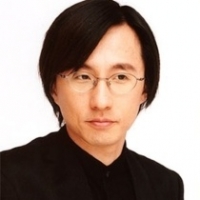
Kaoru Wada (和田 薫 Wada Kaoru?, born May 5, 1962) is a Japanese music composer, music arranger, conductor, music orchestrator and pianist from Shimonoseki, Yamaguchi Prefecture. He studied at the Tokyo College of Music. He is popularly known for his work on anime soundtracks. He became known to the west through work on 3x3 Eyes and Battle Angel, and more recently Samurai 7 and the worldwide hit InuYasha. He also arranged works for orchestra and piano on original soundtracks like Kingdom Hearts and Kingdom Hearts II.
His powerful and sweeping melodies are given counterpoint by his sometime harsh, creepy lilting themes of suspense. His most popular works usually are found on the soundtracks of series with heavy emotional and supernatural themes being juxtaposed.
Wada is also an apprentice of the famed Godzilla composer, Akira Ifukube. Wada is married to InuYasha seiyū Akiko Nakagawa, who also voices Sota Higurashi in that anime.
His powerful and sweeping melodies are given counterpoint by his sometime harsh, creepy lilting themes of suspense. His most popular works usually are found on the soundtracks of series with heavy emotional and supernatural themes being juxtaposed.
Wada is also an apprentice of the famed Godzilla composer, Akira Ifukube. Wada is married to InuYasha seiyū Akiko Nakagawa, who also voices Sota Higurashi in that anime.
Bach

Johann Sebastian Bach (31 March 1685 – 28 July 1750) was a German composer and organist whose sacred and secular works for choir, orchestra, and solo instruments drew together the strands of the Baroque period and brought it to its ultimate maturity. Although he introduced no new forms, he enriched the prevailing German style with a robust contrapuntal technique, an unrivalled control of harmonic and motivic organisation in composition for diverse musical forces, and the adaptation of rhythms and textures from abroad, particularly Italy and France.
Revered for their intellectual depth and technical and artistic beauty, Bach's works include the Brandenburg concertos; the Goldberg Variations; the English Suites, French Suites, Partitas, and Well-Tempered Clavier; the Mass in B Minor; the St. Matthew Passion; the St. John Passion; The Musical Offering; The Art of Fugue; the Sonatas and Partitas for violin solo; the Cello Suites; more than 200 surviving cantatas; and a similar number of organ works, including the celebrated Toccata and Fugue in D Minor.
While Bach's fame as an organist was great during his lifetime, he was not particularly well-known as a composer. His adherence to Baroque forms and contrapuntal style was considered "old-fashioned" by his contemporaries, especially late in his career when the musical fashion tended towards Rococo and later Classical styles. A revival of interest and performances of his music began early in the 19th century, and he is now widely considered to be one of the greatest composers in the Western tradition.
Revered for their intellectual depth and technical and artistic beauty, Bach's works include the Brandenburg concertos; the Goldberg Variations; the English Suites, French Suites, Partitas, and Well-Tempered Clavier; the Mass in B Minor; the St. Matthew Passion; the St. John Passion; The Musical Offering; The Art of Fugue; the Sonatas and Partitas for violin solo; the Cello Suites; more than 200 surviving cantatas; and a similar number of organ works, including the celebrated Toccata and Fugue in D Minor.
While Bach's fame as an organist was great during his lifetime, he was not particularly well-known as a composer. His adherence to Baroque forms and contrapuntal style was considered "old-fashioned" by his contemporaries, especially late in his career when the musical fashion tended towards Rococo and later Classical styles. A revival of interest and performances of his music began early in the 19th century, and he is now widely considered to be one of the greatest composers in the Western tradition.
Joe Hisaishi

Mamoru Fujisawa (藤澤 守 Fujisawa Mamoru?), known professionally as Joe Hisaishi (久石 譲 Hisaishi Jō?, born December 6, 1950), is a composer and director known for over 100 film scores and solo albums dating back to 1981.
While possessing a stylistically distinct sound, Hisaishi's music has been known to explore and incorporate different genres, including minimalist, experimental electronic, European classical, and Japanese classical. Lesser known are the other musical roles he plays; he is also a typesetter, author, arranger, and head of an orchestra.
He is best known for his work with animator Hayao Miyazaki, having composed scores for many of his films including Nausicaä of the Valley of the Wind (1984), My Neighbor Totoro (1988), Princess Mononoke (1997), Spirited Away (2001), Howl's Moving Castle (2004) and Ponyo (2008). He is also recognized for the soundtracks he has provided for filmmaker 'Beat' Takeshi Kitano, including Dolls (2002), Kikujiro (1999), Hana-bi (1997), Kids Return (1996), Sonatine (1993).
While possessing a stylistically distinct sound, Hisaishi's music has been known to explore and incorporate different genres, including minimalist, experimental electronic, European classical, and Japanese classical. Lesser known are the other musical roles he plays; he is also a typesetter, author, arranger, and head of an orchestra.
He is best known for his work with animator Hayao Miyazaki, having composed scores for many of his films including Nausicaä of the Valley of the Wind (1984), My Neighbor Totoro (1988), Princess Mononoke (1997), Spirited Away (2001), Howl's Moving Castle (2004) and Ponyo (2008). He is also recognized for the soundtracks he has provided for filmmaker 'Beat' Takeshi Kitano, including Dolls (2002), Kikujiro (1999), Hana-bi (1997), Kids Return (1996), Sonatine (1993).
Regina Spektor

Regina Spektor (born February 18, 1980) is a Soviet-born Jewish-American singer-songwriter and pianist. Her music is associated with the anti-folk scene centered on New York City's East Village.
Spektor has said that she has created 700 songs, but that she rarely writes any of them down. She has also stated that she never aspired to write songs herself, but songs seem to just flow to her. Spektor possesses a broad vocal range and uses the full extent of it. She also explores a variety of different and somewhat unorthodox vocal techniques, such as verses composed entirely of buzzing noises made with the lips and beatbox-style flourishes in the middle of ballads, and also makes use of such unusual musical techniques as using a drum stick to tap rhythms on the body of the piano or chair.
Her lyrics are equally eclectic, often taking the form of abstract narratives or first-person character studies, similar to short stories or vignettes put to song. Spektor usually sings in English, though she sometimes includes a few words or verses of Latin, Russian, French, and other languages in her songs.
Spektor has said that she has created 700 songs, but that she rarely writes any of them down. She has also stated that she never aspired to write songs herself, but songs seem to just flow to her. Spektor possesses a broad vocal range and uses the full extent of it. She also explores a variety of different and somewhat unorthodox vocal techniques, such as verses composed entirely of buzzing noises made with the lips and beatbox-style flourishes in the middle of ballads, and also makes use of such unusual musical techniques as using a drum stick to tap rhythms on the body of the piano or chair.
Her lyrics are equally eclectic, often taking the form of abstract narratives or first-person character studies, similar to short stories or vignettes put to song. Spektor usually sings in English, though she sometimes includes a few words or verses of Latin, Russian, French, and other languages in her songs.
Morgan Lewis
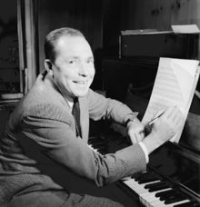
William Morgan "Buddy" Lewis, Jr. (26 December 1906 – 8 December 1968) was a writer of jazz songs, some of which were also recorded in the pop music genre.Lewis was born in Rockville, Connecticut and died in New York City. He wrote songs and Broadway theatre scores with lyricist Nancy Hamilton including "How High the Moon" and "The Old Soft Shoe".
Claude Debussy
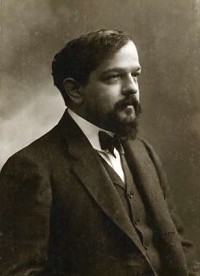
Achille-Claude Debussy (French pronunciation: ) (August 22, 1862 – March 25, 1918) was a French composer. Along with Maurice Ravel, he was one of the most prominent figures working within the field of impressionist music, though he himself intensely disliked the term when applied to his compositions. Debussy is not only among the most important of all French composers but also a central figure in European music at the turn of the twentieth century.
His music is noted for its sensory component and how it is not often formed around one key or pitch. Often Debussy's work reflected the activities or turbulence in his own life. His music virtually defines the transition from late-Romantic music to twentieth century modernist music. In French literary circles, the style of this period was known as symbolism, a movement that directly inspired Debussy both as a composer and as an active cultural participant.
His music is noted for its sensory component and how it is not often formed around one key or pitch. Often Debussy's work reflected the activities or turbulence in his own life. His music virtually defines the transition from late-Romantic music to twentieth century modernist music. In French literary circles, the style of this period was known as symbolism, a movement that directly inspired Debussy both as a composer and as an active cultural participant.
Henryk Wieniawski

Henryk Wieniawski (10 July 1835 – 31 March 1880) was a Polish violinist and composer. He was considered a violinist of genius and wrote some of the most important works in the violin repertoire, including two extremely difficult violin concertos, the second of which (in D minor, 1862) is more often performed than the first (in F♯ minor, 1853). His "L'Ecole Moderne, 10 Etudes-Caprices" is a very well known and required work for aspiring violinists. His Scherzo-Tarantelle, Op. 16 and Légende, Op. 17 are also frequently performed works. He also wrote two popular mazurkas for solo violin and piano accompaniment (the second one, Obertas, in G Major), using techniques such as left-hand pizzicato, harmonics, large leaps, and many double stops. Wieniawski has been given a number of posthumous honors. His portrait appeared on a postage stamp of Poland in 1952 and again in 1957. A 100 Złoty coin was issued in 1979 bearing his image.
What is sometimes called the "Russian bow grip" ought to be called the "Wieniawski bow grip": Wieniawski taught his students his own kind of very stiff bowing that allowed him to play a "devil's staccato" with ease. This "devil's staccato" was easily used to discipline students.
What is sometimes called the "Russian bow grip" ought to be called the "Wieniawski bow grip": Wieniawski taught his students his own kind of very stiff bowing that allowed him to play a "devil's staccato" with ease. This "devil's staccato" was easily used to discipline students.
The Secret Garden

The Secret Garden is a musical based on the 1909 novel of the same name by Frances Hodgson Burnett. The musical's book and lyrics are by Marsha Norman, with music by Lucy Simon. It premiered on Broadway at the St. James Theatre on 25 April 1991 and closed on 3 January 1993 after 709 performances.
The musical, set in 1906, tells of a young English girl, Mary, who is forced to move to England from colonial India when her parents die in a cholera outbreak. There she lives with her emotionally stunted Uncle Archibald and her invalid cousin. Discovering a hidden and neglected garden, and bravely overcoming dark forces, she and a young gardener bring it back to life at the same time as she brings new life to her cousin and uncle.
The Secret Garden garnered the 1991 Tony Awards for Best Book of a Musical, Best Featured Actress in a Musical (Daisy Eagan), and Best Scenic Design (Heidi Landesman). The set resembled an enormous Victorian toy theatre with pop-out figures, large paper dolls, and Joseph Cornell-like collage elements.
The musical, set in 1906, tells of a young English girl, Mary, who is forced to move to England from colonial India when her parents die in a cholera outbreak. There she lives with her emotionally stunted Uncle Archibald and her invalid cousin. Discovering a hidden and neglected garden, and bravely overcoming dark forces, she and a young gardener bring it back to life at the same time as she brings new life to her cousin and uncle.
The Secret Garden garnered the 1991 Tony Awards for Best Book of a Musical, Best Featured Actress in a Musical (Daisy Eagan), and Best Scenic Design (Heidi Landesman). The set resembled an enormous Victorian toy theatre with pop-out figures, large paper dolls, and Joseph Cornell-like collage elements.
The Wolfe Tones

The Wolfe Tones are an Irish rebel music band that incorporate Irish traditional music in their songs. Formed in 1963, they take their name from Theobald Wolfe Tone, one of the leaders of the Irish Rebellion of 1798, with the double meaning of a wolf tone – a spurious sound that can affect instruments of the violin family.
Anton Diabelli
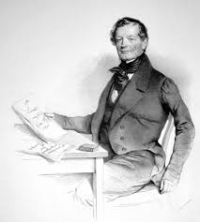
Anton (or Antonio) Diabelli (6 September 1781 – 7 April 1858) was an Austrian music publisher, editor and composer. Best known in his time as a publisher, he is most familiar today as the composer of the waltz on which Ludwig van Beethoven wrote his set of thirty-three.
D.R.Bellwood
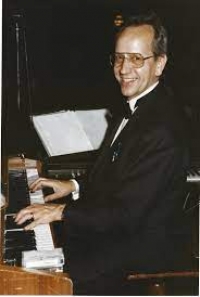
After many years working as a music teacher in schools, I now run my own business, 'Music By Arrangement', creating customised sheet music arrangements for ensembles in schools, music centres and churches, etc. Schools will often have a very unusual combination of instruments and players available, often at very different levels of ability. My compositions and arrangements of folk music and popular classics are based on my vast experience of directing orchestras, bands and ensembles in schools and area music centres, notably in the Leeds area. A full list of titles is shown on my website at musicbyarrangement.co.uk
Yuki Kajiura

Yuki Kajiura (梶浦 由記 Kajiura Yuki?, born August 6, 1965 in Tokyo, Japan) is a Japanese composer and music producer. She has provided the music for several popular anime series, such as the final Kimagure Orange Road movie, Noir, .hack//Sign, Aquarian Age, Madlax, My-HiME, My-Otome, .hack//Roots, Pandora Hearts, Puella Magi Madoka Magica, Sword Art Online, Tsubasa Chronicle and the Kara no Kyoukai movies (amongst others). She also assisted Toshihiko Sahashi with Mobile Suit Gundam SEED and Mobile Suit Gundam SEED Destiny. Kajiura has also composed for video games, including the cutscene music for Xenosaga II and the entire Xenosaga III game soundtrack.
Henry Purcell

Henry Purcell (pronounced /ˈpɜrsəl/; 10 September 1659 (?) – 21 November 1695), was an English organist and Baroque composer of secular and sacred music. Although Purcell incorporated Italian and French stylistic elements into his compositions, his legacy was a uniquely English form of Baroque music.
The Kingston Trio
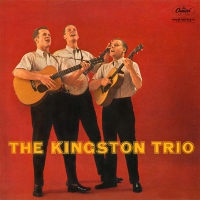
The Kingston Trio is an American folk and pop music group that helped launch the folk revival of the late 1950s to late 1960s. The group started as a San Francisco Bay Area nightclub act with an original lineup of Dave Guard, Bob Shane, and Nick Reynolds. It rose to international popularity fueled by unprecedented sales of LP records and helped alter the direction of popular music in the U.S.
Caro Emerald

Caroline Esmeralda van der Leeuw (born 26 April 1981), known by her stage name Caro Emerald, is a Dutch pop and jazz singer who mainly performs in English. Active since 2007, she rose to prominence in 2009 with her debut single, "Back It Up". Her follow-up single "A Night Like This" topped charts in the Netherlands. Emerald is often praised for her outstanding live performances.
Mozart

Wolfgang Amadeus Mozart, full name Johann Chrysostom Wolfgang Amadeus Mozart (27 January 1756 â 5 December 1791) was a prolific and influential composer of the Classical era. His over 600 compositions include works widely acknowledged as pinnacles of symphonic, concertante, chamber, piano, operatic, and choral music. Mozart is among the most enduringly popular of classical composers, and many of his works are part of the standard concert repertoire.
Mozart's music, like Haydn's, stands as an archetypal example of the Classical style. His works spanned the period during which that style transformed from one exemplified by the style galant to one that began to incorporate some of the contrapuntal complexities of the late Baroque, complexities against which the galant style had been a reaction. Mozart's own stylistic development closely paralleled the development of the classical style as a whole. In addition, he was a versatile composer and wrote in almost every major genre, including symphony, opera, the solo concerto, chamber music including string quartet and string quintet, and the piano sonata. While none of these genres were new, the piano concerto was almost single-handedly developed and popularized by Mozart. He also wrote a great deal of religious music, including masses; and he composed many dances, divertimenti, serenades, and other forms of light entertainment.
The central traits of the classical style can be identified in Mozart's music. Clarity, balance, and transparency are hallmarks of his work.
Mozart's music, like Haydn's, stands as an archetypal example of the Classical style. His works spanned the period during which that style transformed from one exemplified by the style galant to one that began to incorporate some of the contrapuntal complexities of the late Baroque, complexities against which the galant style had been a reaction. Mozart's own stylistic development closely paralleled the development of the classical style as a whole. In addition, he was a versatile composer and wrote in almost every major genre, including symphony, opera, the solo concerto, chamber music including string quartet and string quintet, and the piano sonata. While none of these genres were new, the piano concerto was almost single-handedly developed and popularized by Mozart. He also wrote a great deal of religious music, including masses; and he composed many dances, divertimenti, serenades, and other forms of light entertainment.
The central traits of the classical style can be identified in Mozart's music. Clarity, balance, and transparency are hallmarks of his work.
Leopold Mozart
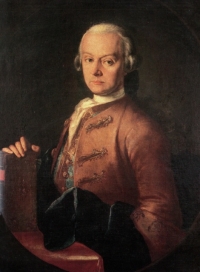
Johann Georg Leopold Mozart (November 14, 1719 – May 28, 1787) was a composer, conductor, teacher, and violinist. He is best known today as the father and teacher of Wolfgang Amadeus Mozart, and for his violin textbook Versuch einer gründlichen Violinschule.
Leopold Mozart's music is inevitably overshadowed by the work of his son Wolfgang, and in any case the father willingly sacrificed his own career to promote his son's. But Leopold's Cassation in G for Orchestra and Toys (Toy Symphony), once attributed to Joseph Haydn, remains popular, and a number of symphonies, a trumpet concerto, and other works also survive. He was much concerned with a naturalistic feel to his compositions, his Jagdsinfonie (or Sinfonia da Caccia for four horns and strings) calls for dogs and shotguns, and his Bauernhochzeit (Peasant Wedding) includes bagpipes, hurdy-gurdy, a dulcimer, whoops and whistles (ad. lib.), and pistol shots.
His oeuvre was extensive, but it has only been until recently that scholars have begun to assess the scope or the quality of it; much is lost and it is not known how representative the surviving works are of his overall output. Cliff Eisen, who wrote a doctoral dissertation on Leopold Mozart's symphonies, finds in a Symphony in G major examples of his "sensitivity to orchestral colour" and a work that "compares favourably with those of virtually any of Mozart’s immediate contemporaries."
Leopold Mozart's music is inevitably overshadowed by the work of his son Wolfgang, and in any case the father willingly sacrificed his own career to promote his son's. But Leopold's Cassation in G for Orchestra and Toys (Toy Symphony), once attributed to Joseph Haydn, remains popular, and a number of symphonies, a trumpet concerto, and other works also survive. He was much concerned with a naturalistic feel to his compositions, his Jagdsinfonie (or Sinfonia da Caccia for four horns and strings) calls for dogs and shotguns, and his Bauernhochzeit (Peasant Wedding) includes bagpipes, hurdy-gurdy, a dulcimer, whoops and whistles (ad. lib.), and pistol shots.
His oeuvre was extensive, but it has only been until recently that scholars have begun to assess the scope or the quality of it; much is lost and it is not known how representative the surviving works are of his overall output. Cliff Eisen, who wrote a doctoral dissertation on Leopold Mozart's symphonies, finds in a Symphony in G major examples of his "sensitivity to orchestral colour" and a work that "compares favourably with those of virtually any of Mozart’s immediate contemporaries."
Michael Patti
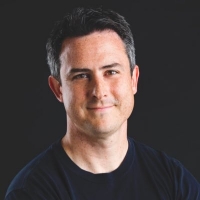
Michael Patti is a composer, orchestrator and synthestrator of music for film and games in Los Angeles, ..Works with: Azeroth Music Movies: Speechless, Look Away, Love Thy Neighbor Albums: StarCraft II: Legacy of the Void
Hubert Parry
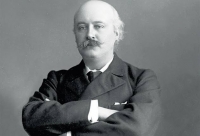
Sir Charles Hubert Hastings Parry, 1st Baronet was an English composer, teacher and historian of music. Parry's first major works appeared in 1880
Benjamin Godard
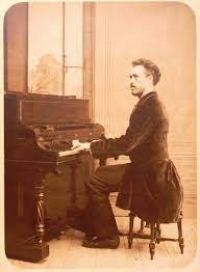
Benjamin Louis Paul Godard (18 August 1849 – 10 January 1895) was a French violinist and Romantic-era composer of Jewish extraction, best known for his opera Jocelyn. Godard composed eight operas, five symphonies, two piano and two violin concertos, string quartets, sonatas for violin and piano, piano pieces and etudes, and more than a hundred songs. He died at the age of 45 in Cannes (Alpes-Maritimes) of tuberculosis and was buried in the family tomb in Taverny in the French department of Val-d'Oise.
Jimmy Roberts
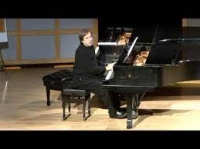
Jimmy Roberts is an American composer for the musical theater as well as a pianist and entertainer. His musical scores include: I Love You, You're Perfect, Now Change and The Thing About Men, both with book and lyrics by Joe DiPietro.
Ciprian Porumbescu
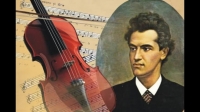
Ciprian Porumbescu was a Romanian composer born in Șipotele Sucevei in Bukovina. He was among the most celebrated Romanian composers of his time; his popular works include Crai nou, Trei culori, Song for the 1st of May, Ballad for violin and piano, and Serenada. Born: October 14, 1853, Bukovina Died: June 6, 1883, Ciprian Porumbescu, Suceava, Romania
Education: University of Music and Performing Arts, Vienna Parents: Iraclie Porumbescu, Emilia Golembiovski
Record labels: Electrecord, VDE-GALLO, Marcophon Grandparents: Atanasie Golembiovski, Varvara Crăciun
Education: University of Music and Performing Arts, Vienna Parents: Iraclie Porumbescu, Emilia Golembiovski
Record labels: Electrecord, VDE-GALLO, Marcophon Grandparents: Atanasie Golembiovski, Varvara Crăciun
Vocaloid

Vocaloid (ボーカロイド, Bōkaroido) is a singing voice synthesizer software product. Its signal processing part was developed through a joint research project led by Kenmochi Hideki at the Pompeu Fabra University in Barcelona, Spain, in 2000 and was not originally intended to be a full commercial project. Backed by the Yamaha Corporation, it developed the software into the commercial product "Vocaloid" that was released in 2004.
Jay Ungar
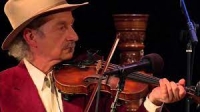
Jay Ungar (born November 14, 1946) is an American folk musician and composer.Ungar was born in the Bronx, New York City. He frequented Greenwich Village music venues during his formative period in the 1960s. In the late 1960s, he became a member of Cat Mother and the All Night News Boys and later, the Putnam String County Band. Although he performs with David Bromberg, he is probably best known for "Ashokan Farewell" (1982), composed as a lament, and used as the theme tune to the Ken Burns documentary The Civil War (1990). Many of his other compositions are familiar as contradance tunes, notably "The Wizard's Walk."In 1991, Ungar married fellow musician Molly Mason. They met during the 1970s. They continue to perform as a duo, with their band, Swingology, and as the Jay Ungar and Molly Mason Family Band with Jay's daughter Ruth Ungar (her mother is Lyn Hardy) and her husband Michael Merenda.
Jay Chou
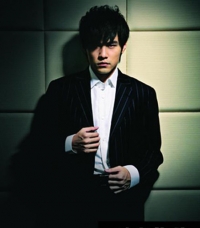
Jay Chou (traditional Chinese: 周杰倫; simplified Chinese: 周杰伦; pinyin: Zhōu Jiélún; Wade-Giles: Chou Chieh-lun; Pe̍h-ōe-jī: Chiu Kia̍t-lûn) (born January 18, 1979) is a Taiwanese musician, singer, producer, actor and director who has won the World Music Award four times. He is well-known for composing all his own songs and songs for other singers. In 1998 he was discovered in a talent contest where he displayed his piano and song-writing skills. Over the next two years, he was hired to compose for popular Chinese singers. Although he was trained in classical music, Chou combines Chinese and Western music styles to produce songs that fuse R&B, rock and pop genres, covering issues such as domestic violence, war, and urbanization.
In 2000 Chou released his first album, titled Jay, under the record company Alfa Music. Since then he has released one album per year, selling several million copies each. His music has gained recognition throughout Asia, most notably in regions such as Taiwan, China, Hong Kong, Japan, Malaysia, Indonesia, Singapore, Thailand, Vietnam and in overseas Asian communities, winning more than 20 awards each year. He has sold over 25 million albums worldwide. He debuted his acting career in Initial D (2005), for which he won Best Newcomer Actor in Golden Horse Awards, and was nominated for Best Supporting Actor by Hong Kong Film Awards for his role in Curse of the Golden Flower (2006). His career now extends into directing and running his own record company JVR Music. He has also endorsed various models of Media Players released by Onda in which he appears on the box, and his signature and likeness is printed on the back of certain models of these players.
In 2000 Chou released his first album, titled Jay, under the record company Alfa Music. Since then he has released one album per year, selling several million copies each. His music has gained recognition throughout Asia, most notably in regions such as Taiwan, China, Hong Kong, Japan, Malaysia, Indonesia, Singapore, Thailand, Vietnam and in overseas Asian communities, winning more than 20 awards each year. He has sold over 25 million albums worldwide. He debuted his acting career in Initial D (2005), for which he won Best Newcomer Actor in Golden Horse Awards, and was nominated for Best Supporting Actor by Hong Kong Film Awards for his role in Curse of the Golden Flower (2006). His career now extends into directing and running his own record company JVR Music. He has also endorsed various models of Media Players released by Onda in which he appears on the box, and his signature and likeness is printed on the back of certain models of these players.
 Sheet Music Network is a site for those who wants to access popular sheet music easily,
letting them download the sheet music for free for trial purposes.
It's completely free to download and try the listed sheet music, but you have to delete the files after 24 hours of trial.
Don't forget, if you like the piece of music you have just learned playing,
treat the artist with respect, and go buy the original sheet music.
Sheet Music Network is a site for those who wants to access popular sheet music easily,
letting them download the sheet music for free for trial purposes.
It's completely free to download and try the listed sheet music, but you have to delete the files after 24 hours of trial.
Don't forget, if you like the piece of music you have just learned playing,
treat the artist with respect, and go buy the original sheet music.
